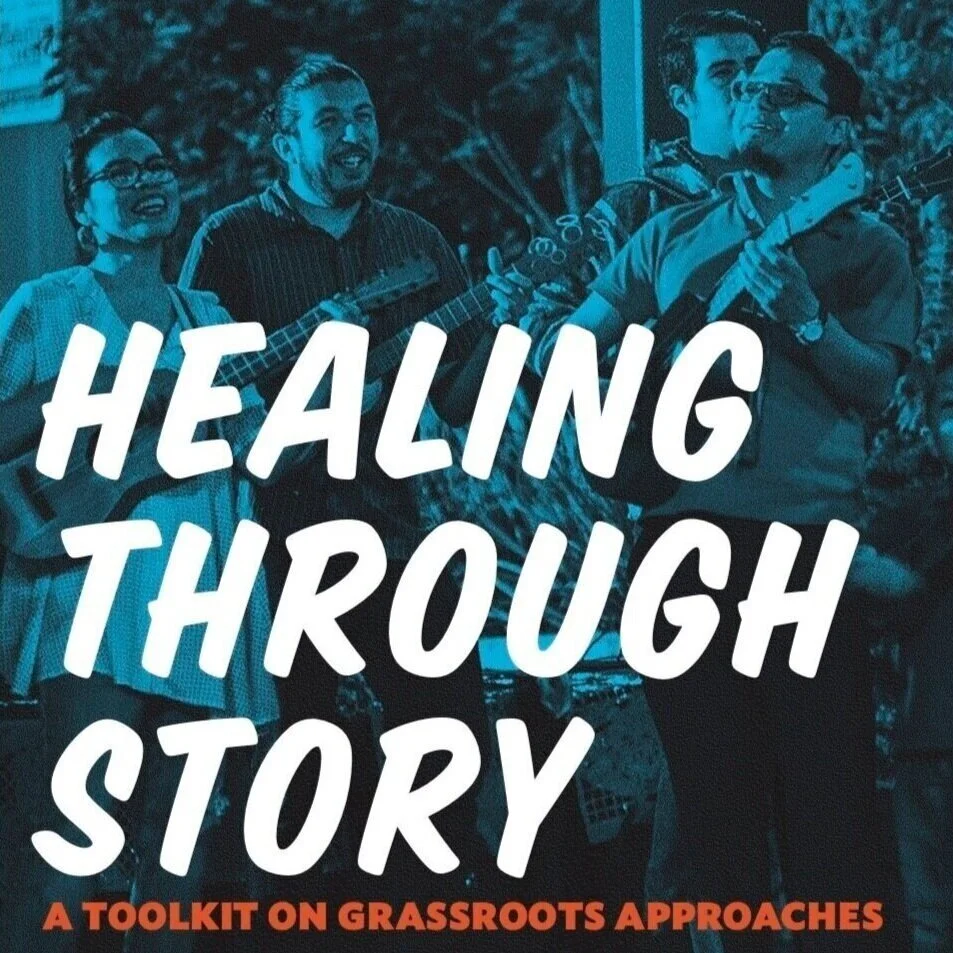“When we’re caught up in a crisis, creativity is a path out of it.”
“... paradigm-shifting practical exercises and grounded community stories.”
What is it?
A free, downloadable, 70-page toolkit containing:
methods to listen and reflect on our own biases
Instructions on facilitating a group
Interviews with 11 grassroots groups in Los Angeles County on how we heal
The exercises in the toolkit can be done in-person, by video conference or even by phone. They offer structures of listening like story circles, a method developed by John O’Neal of Junebug Productions and by Roadside Theater, as well as other practices of shared listening, facilitation and unlearning implicit biases.
We all bring unique insight and intelligence to the world. Practices of listening can deepen our capacity to respond flexibly to new challenges.
We are facing a global pandemic rooted in the larger crises of poverty and other injustices. Sharing our stories can help us connect and process sudden realities as we seek to address the most pressing issues in our world today. It is both timely and timeless.
Healing requires community towards the larger goal of dismantling systemic oppressions at the core of many of our mental health crises. If I lose my housing or other basic means of survival, that impacts my mental health. And right now, many grassroots groups are leading frontlines of response as trusted networks from communities themselves.
Who is it for?
It’s for people interested in community-driven solutions. It is for educators, facilitators, artists, organizers or others interested in building community power towards shared goals. It’s also for people who want to make meetings more interesting.
Featuring Interviews with…
Jacqueline Alexander-Sykes, St. Elmo Village
Joel Garcia, Meztli Projects
Daisy Gonzalez, Garment Worker Center
Jeremiah Gordon & Kenneth Spencer, Los Angeles Black Worker Center
Guadalupe Chávez & Melanie Griffin, Dignity and Power Now
Pharaoh Mitchell, The Community Action League
Jen Hofer & Alexia Veytia, Antena Los Ángeles
Luis J. Rodriguez & Trini Rodriguez, Tía Chucha’s Centro Cultural & Bookstore
Sophanarot Sam, Southeast Asian Community Alliance
Manuel Villanueva, Restaurant Opportunities Center—Los Angeles
Sarah Williams, Women’s Center for Creative Work
What is Facilitation?
A process of guiding a group to identify and move towards shared goals. Arts-based facilitation uses creative expression as part of the process. When we facilitate, our leadership can amplify our strengths and also our struggles. Because we are immersed in a world full of biases, it’s impossible to not absorb them ourselves. Understanding how our identities and experiences shape us can help us expand our ability to lead or guide others. Our fears and defenses tend to surface more when we are stressed. It’s both healing and useful to build our own practices of self-reflection. I have relied on practices of shared listening and story circles for years to build my own capacity to listen across difference.
Background
From April 2019 to April 2020 I worked as the Los Angeles County Department of Arts and Culture’s Creative Strategist Artist-in-Residence (CS-AIR) at the Los Angeles County Department of Mental Health (DMH). It was the institution’s first position of its kind. In alignment with their 2020-2030 strategic plan, I conducted a listening tour of some of the many grassroots groups in Los Angeles County engaged in arts and organizing. My goals were three-fold:
Map where grassroots networks function as trusted wellness centers
Understand community-based approaches to healing that address systemic inequality
Identify ways DMH can support community-informed models of mental health care
It’s by no means a comprehensive list but rather a point of departure. Feel free to contact me if you have ideas, suggestions or just want to connect!
Listening and storytelling are at the heart of my theater work. As part of the larger field of civic practice, the skills of artists can apply not just to creating art but to “collaboration and co-design with community partners and local residents around a community-defined aspiration, challenge or vision” (CPCP). The CS-AIR residency was an opportunity to highlight arts-based practices and the leadership of directly-impacted communities towards the larger goal of equitable policy and social transformation.
Some Shine
Los Angeles County Department of Arts & Culture
“Artists as Essential Workers” by Americans for the Arts
Credits
Author: Anu Yadav. Editors: Trini Rodriguez, Maxine LeGall & Q.T. Jackson Jr. Graphic Designer: Joshua Gamma. Additional Consultation: Joel Garcia, Q. Terah Jackson III, Rebecca Gomez, Jen Lemen, Patrick Masterson & Luis J. Rodriguez. This project was made possible by the Los Angeles County Department of Arts and Culture’s Creative Strategist Artist-in-Residence program.
Acknowledgements
Thanks to Los Angeles County Department of Mental Health Connectors Angel Baker, Mimi McKay and Keris Jän Myrick for their partnership and vision in this project. Thanks to Robin Garcia, Kimberly Glann, Pauline Kamiyama and Elaine Waldman whose guidance and support was instrumental to the residency. Thank you to: the 2019-2020 Creative Strategist Artist-in-Residence Cohort (Deborah Aschheim, Clement Hanami, Olga Koumoundouros, Sandra de la Loza and Alan Nakagawa), Camila Alvarado, Julio Alvarado, Michael Centeno, Sandra Chang, Kate DeCiccio, Daniel Estrada, Hilda Eke, Natalie Godinez, Tracy Gregory, Alexa Kim, De’Andrea Lottier-Ross, Leda Maliga, Bernice Mascher, Betty Marín, Soraya Medina, Pinki Mehta, Kumar Menon, Kevin Muir, Brian Navarro, Marissa Nuncio, Mirtala Parada-Ward, Dr. Jorge Partida Del Toro, Lamia El Sadek, Mark Schubb, Yosi Sergant, Allison Smith, Michael Rohd, Destiny Walker, Sunnie Whipple and Jacqueline Wilcoxen. Thank you to the Alliance of California Traditional Arts, Anti-Recidivism Coalition, Bacup, The Center for Performance and Civic Practice, Khmer Girls in Action, Korean Immigrant Workers Alliance, Instituto de Educación Popular del Sur de California, Los Angeles Tenants’ Union, Los Angeles Alliance for a New Economy, ProjectQ and Self Help Graphics.

